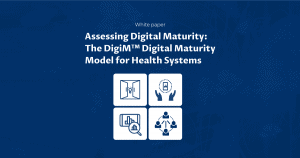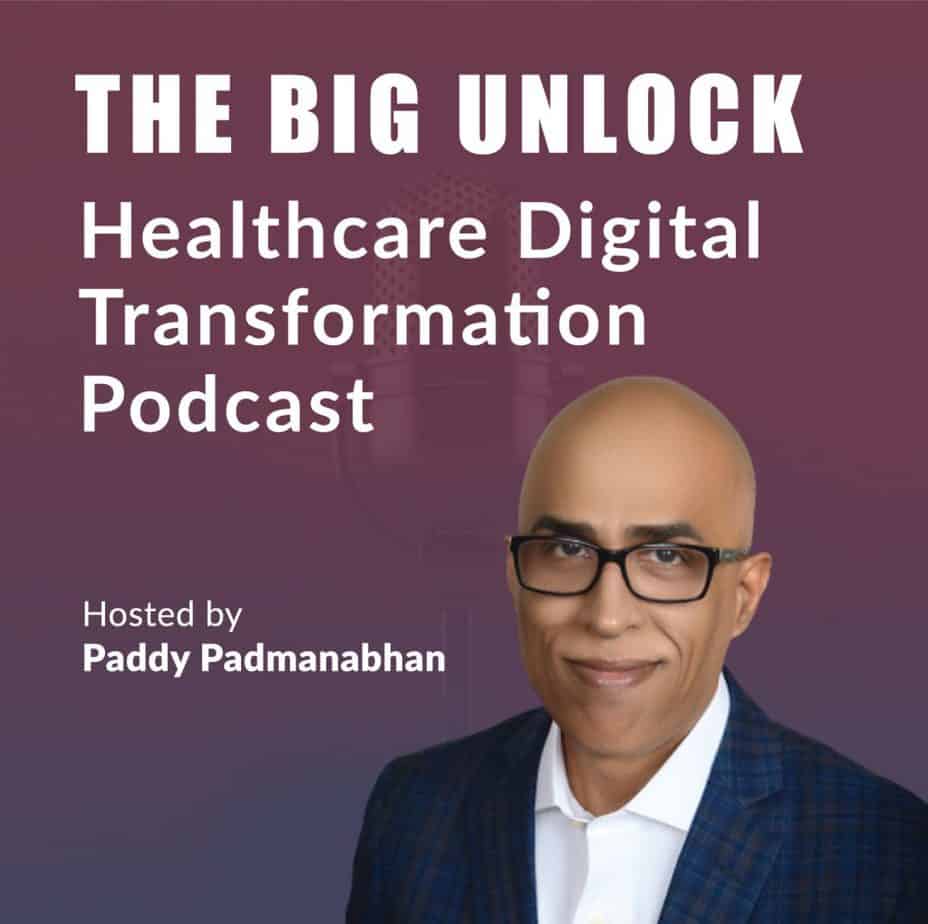Healthcare Digital Transformation: Outlook and Recommendation for 2019
by Paddy Padmanabhan, CEO, Damo Consulting Inc.
In our inaugural review of healthcare’s digital transformation, we assess the current state of digital, analytics, and technology-led innovation in healthcare, and offer our recommendations to healthcare enterprises and technology solution providers.
Digital transformation will gain momentum, but health systems will look at EHR systems as primary technology platform for digital health
Our work with healthcare enterprises indicates that health systems are investing in telehealth and remote monitoring, which are the poster children today for transforming patient experiences and improving the quality of care. However, many digital initiatives lack the critical drivers for increased adoption and must compete with multiple priorities for discretionary spend in a margin-constrained environment.
Technology spend, while set to increase, is also now spread across multiple stakeholder groups. “Shadow IT” will create ongoing challenges for Chief Information Officers (CIOs) looking to optimize IT investments through shared governance and technology standardization.
Electronic health record (EHR) systems that form the backbone today for recording and billing for clinical operations will continue to consume a large chunk of enterprise IT budgets in health systems. While big tech firms and digital health startups are approaching digital with superior experience, design, and advanced analytics capabilities, EHR vendors are looking to capitalize on their position as systems of record. CIOs of health systems will face a trade-off. Ease of integration will be weighed against lack of maturity in user experience design and analytical depth in EHR systems.
CIO’s and Chief Digital Officers will be challenged on multiple fronts while trying to advance digital initiatives. Technical debt, in the form of long-pending asset refresh and technology upgrades, will consume a significant portion of IT budgets. Cloud migration and cloud-enablement will become a pre-requisite for many digital health technologies and create redundancies in data architecture and data management infrastructure.
At this time, digital is a game of “small numbers,” and most digital health programs will deliver low returns on investment until they gain enterprise-wide adoption. Digital health programs will also depend on the reimbursement environment and the transition to value-based care. Despite the growth of telehealth as an alternate healthcare delivery model, the reimbursement mechanism has started catching up with adoption rates only recently.
Recommendations
Health systems should continue to leverage existing IT investments but actively look beyond their EHR vendors in 2019 for digital functionalities. Tech firms and startups must demonstrate how their platforms and solutions address specific aspects of patient and caregiver journeys and increase efficiencies through automation. Startups should demonstrate the ease of clinical integration in addition to technical integration.
For every 3.08 hours spent face to face with patients, physicians spend 3.17 hours on desktop medicine. These are the opportunities for our digital age.
– Dr. Albert Chan, Chief of Digital Patient Experience, Sutter Health
Artificial Intelligence (AI) will make steady progress but will struggle with an adoption gap
IBM’ Watson Health’s much-publicized troubles in 2018 (reported extensively by Stat) reveal the limitations of advanced technology in dealing with the complexities of clinical care.
AI has other problems too. There is a backlash against the vendor community’s “black box” algorithms, compounded by the over-hyping and inflated promises resulting from vendors painting everything with an “AI” brush (much as they are doing with the “digital” brush). In 2019, there will be increased focus on the ethical aspects of AI technologies, specifically algorithm bias and adverse profiling.
Notwithstanding these challenges, AI’s future looks good for two reasons:
1. There is mature technology now to mine vast and diverse data sources as machine learning and natural language processing (NLP) algorithms continue to get better.
2. Healthcare enterprises now have many options for partnering on AI technology and analytics solutions, with big tech firms as well as startups.
The challenge for health systems and their technology providers is not just to develop meaningful insights but integrate them seamlessly into clinical workflows and care pathways. Recent consortium efforts to share data and develop common insights, involving 41 health systems including Geisinger, Intermountain, and others could become a model for the future.
Recommendations
AI will make significant gains in 2019 as a useful technology to improve healthcare operations and outcomes. Health systems should continue to invest in proven use cases where AI has demonstrated its usefulness. AI technology vendors should focus more on assuring their customers about responsible use of healthcare data and provide more transparency into how their algorithms work. Improving algorithm accuracy should be a lesser priority than effectively integrating and operationalizing algorithms with proven results more effectively into clinical workflows.
Measures that optimize EHRs, make data more accessible and insightful, and reduce the complexity of quality measurement are much-needed steps to accelerate the transition to value-based care.
– Dr. L. Patrick James, Chief Clinical Officer, Quest Diagnostics
Big tech will struggle to develop a compelling play for digital health, with one possible exception
Who “owns” the healthcare consumer of the future?
Technology firms are engaged in a raging battle over this question. Over the past couple of years, big tech firms like Google, Microsoft, and Salesforce launched health cloud platforms with the intent of becoming the preferred platform ecosystems for digital transformation. However, health cloud platforms are yet to live up to their promise. (Read our paper – Evaluating Health Clouds: A Primer)
Big tech firms have made significant progress in building capabilities to aggregate and analyze large and diverse sources of data. However, their platforms do not provide “last-mile solutions” and depend on EHR vendors for interoperability and access to patient health records. In 2019, big tech firms will increase their focus on building smart partnerships with EHR firms in areas such as advanced analytics and AI.
Microsoft, Amazon, and Google have raised the stakes in 2018 by hiring high-profile clinician executives to come up with the elixir for success in the new digital health landscape. However, it is unclear how these firms are going to approach healthcare in a differentiated way. Among all big tech firms, Apple’s remarkable achievement in turning the Apple watch into an ECG app indicates it is much further along in digital health than any other big tech firm. Apple has also made significant progress in integrating its smartphone apps with a wide range of data sources, including leading EHR systems such as Epic.
Recommendations
Big tech firms, especially the health cloud providers, must demonstrate how their platforms can provide incremental value to healthcare enterprises beyond what is available in EHR systems. They should integrate innovative startups offering “last-mile” solutions as part of their overall value proposition.
Digital is not about magically transforming experiences with technology.
– David Chou, Chief Information and Digital Officer, Children’s Mercy Kansas City
Digital health startups will face a continuing struggle for growth and stability
Today, digital health startups are caught between a rock and a kill zone as they struggle to gain traction with end clients on the one hand and protect themselves from being crushed by big tech competitors on the other. For the first time, we saw public failures of promising startups in 2018. Lantern, Cloudmine, and Quanttus were highly visible startups that shut down or filed for bankruptcy after failing to gain traction in the market. Other startups who started as consumer-facing health apps were forced to pivot to B2B business models to survive. However, health systems are proceeding cautiously, unwilling to bet big on risky startups with unproven technologies. The result is “pilot purgatory” and a race against time for many of the startups, with the threat of their venture capital (VC) masters pulling the plug hanging like the proverbial sword of Damocles over their head. The fundamental challenge for digital health startups remains the same – establishing a value proposition and generating predictable, recurring, healthy revenue streams. More digital health startups will fail publicly in 2019 precipitating a shakeout.
Larger firms were not spared either. Google (Alphabet) quietly shut down its Alcon diabetes-detecting-lens project, one of its many “moonshots” trying to find disruptive new technology solutions for traditional health care problems.
Amidst all this, healthcare enterprises are setting up innovation funds that will tap into the startup ecosystem by taking equity stakes in some cases.
Merger and acquisition (M&A) activity will remain the wildcard in digital health technology markets. In 2019, we will see larger tech firms acquiring startups, startups merging with other startups, and – increasingly – healthcare enterprises acquiring technology firms and startups. Roche’s acquisition of Flatiron Health for $1.9 billion is an example of the type of transactions we can expect to see in 2019. Tech firms are driven by the desire for revenue and market share growth, while healthcare enterprises will look for data, IP, and innovation to drive their enterprise growth strategy.
Recommendations
Healthcare enterprises have no choice but to continue to explore the startup ecosystem for innovation ideas for their long-term future. CIOs, Chief Digital Officers, and Chief Innovation Officers should work together to create more supportive frameworks and environments for promising startups to demonstrate value and help digital health solutions move seamlessly beyond pilot phases into enterprise-wide deployment.
Digital is not about magically transforming experiences with technology.
– Greg Silvesti, Head of Digital Health and Innovation, AbbVie














